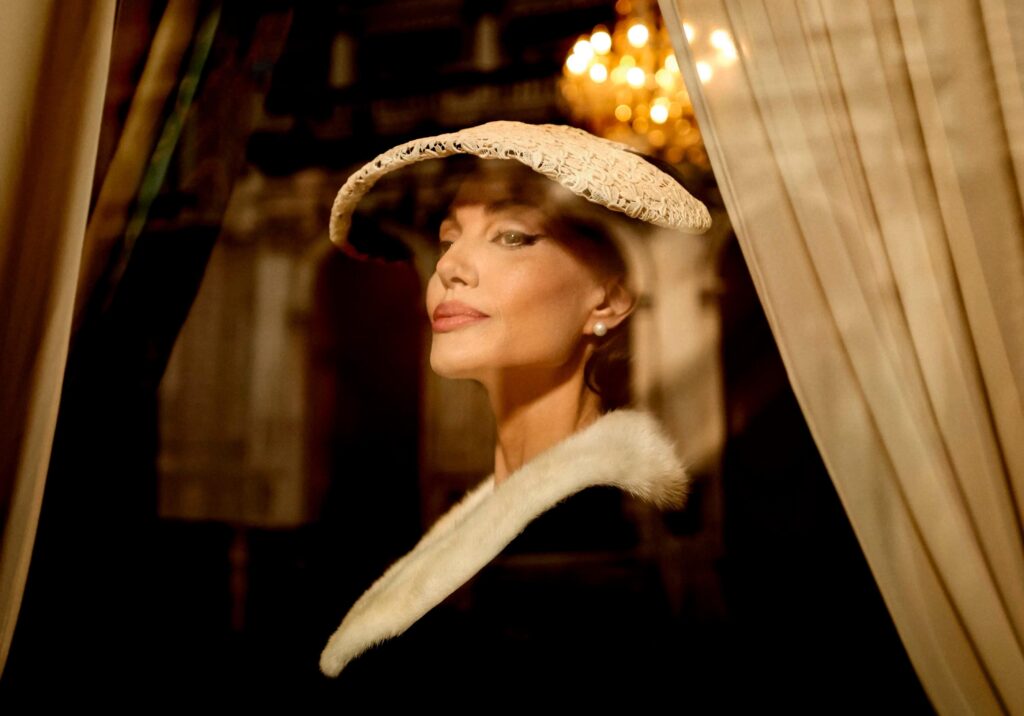
(**)
Some will think that this depressing bio/drama is a disservice to the memory of Maria Callas. That it reduces her to a has-been and a concubine, and she shouldn’t be defined by the tragedies in her life.
When Angelina Jolie takes on a role, she’s all in. She may not look like the American-born, Greek soprano, yet she connects with her stately, regal persona in ways that convince you she’s the prima donna. When her Callas is walking, talking, dictating orders to her faithful butler Ferruccio (Pierfrancesco Favino) and attentive maid Bruna (Alba Rohrwacher), the line between actress and historic figure is gone. Deep in character she sets an aura that lasts for 2h 4m.
The main scenes depict Callas at the end of her career and life. Her diva sensibilities haven’t waned even as reality sets in and things have changed: “I can no longer perform miracles.” Just because the crowds are gone, performances over and her superstar sheen has lost its glow, in her mind she’s still a star. She strolls the streets of Paris in 1977 with a grandeur that’s still a driving force. Even with some doubt, an addiction to pills and declining health, nothing can thwart her grandness.
Second billing must go to the tech elements. Production designer Guy Hendrix Dyas (Inception) creates lavish bedroom setting where Callas holds court, fortified by drugs and shielded by heavy curtains. Set decorators Heather Loeffler, Sandro Piccarozzi and Nóra Talmaier meticulously place props in her bathroom, living room and kitchen. Dressing the aging singer lavishly (costume designer Massimo Cantini Parrini, Cyrano) play into her majesty. The color palette reflects the 1950’s, ‘60s and ‘70s well. All on view is perfectly lit and photographed (Edward Lachman, Far From Heaven). Chapters, scenes and moments are expertly clipped (editor Sofía Subercaseaux). It’s all Oscar quality.
The film’s concept is the issue. Director Pablo Larrain has created slice-of-life renderings of famous women before in movies. Spencer featured Princess Diana giving the stodgy royals a hard time. Jackie chronicled the worst days of Jacqueline Kennedy Onassis, who miraculously kept her dignity during her husband’s assassination. Curiously, Larraine and screenwriter Steven Knight (Dirty Pretty Things) have decided to focus on Callas’ last days. She’s weary, trying to reignite her stage performances when her voice is unwilling. Her psyche is beat down and she’s living off the fumes of her fame. The high points in her career are just faded memories.
For those who know little about this world-renown star, one of the best-selling opera singers of the 20th century, this learning experience has little payoff. The footage starts with a death. It ends with a death. What comes in between feels like rehash and not a fair, thoughtful telling of Callas’ glory. And yes, she had glory.
The peak of her live performances was her role in Giacomo Puccini’s Tosca in 1953. She sold over 1.2M records. Music lovers admired her bel canto technique, flexible voice and dramatic interpretations. But even more than just being a singer, she was a celebrity. A Liz Taylor and Taylor Swift before there were Liz Taylors and Taylor Swifts. Seeing the highlights of her life in retrospect, in reminisces, doesn’t do justice to her brilliance. As her death spiral takes center stage, try as audiences may, they can’t get away from a woefully misguided hypothesis that it’s better to build a bio around Callas at her tragic end then at her zenith.
However, there are diversions. Her dalliances with the very wealthy and unattractive Greek entrepreneur Aristotle Onassis (Haluk Bilginer) were controversial. Onassis, “I’m ugly but I’m rich!” As it plays out on screen, with other international jet-set elites, like JFK (Caspar Phillipson), these scenes become glimpses of a history that intrigued the press and gossip columns back in the day. The sad part is that Callas doesn’t seem in control of her romantic destiny. It’s another instance where the audience is forced to wallow in her misfortune.
Though Jolie is deft at handling the non-singing parts of the character, her lip-synching is tepid, sometimes atrocious. She doesn’t project her voice, or being, like an opera star does. Her performances on stage look like an actor trying to sing when they know nothing about the procedure. Coy scenes with JFK are better acted. Moments with Onassis bring on a melancholia that doesn’t leave. Pestering by the young filmmaker Mandrax (Kodi Smit-McPhee, The Power of the Dog) gives her a chance to toy with a youngster who doesn’t know how crafty older women can be. When she’s not singing, Jolie’s Callas is on the mark.
Angelina Jolie may be in the running for an Oscar nom for Best Actress for pulling this rabbit out of her hat. Members of the tech crew may receive recognition too. If Larrain and Knight are waiting for that kind of acknowledgement, they shouldn’t hold their breath. They’re the ones who are off key. Because of them, Callas’ memory is tarnished by this project.
Trailer: https://www.youtube.com/watch?v=gEtgEc9vlkI
For more information about the New York Film Festival go to https://www.filmlinc.org/nyff2024/guide/.
Visit Film Critic Dwight Brown at DwightBrownInk.com.